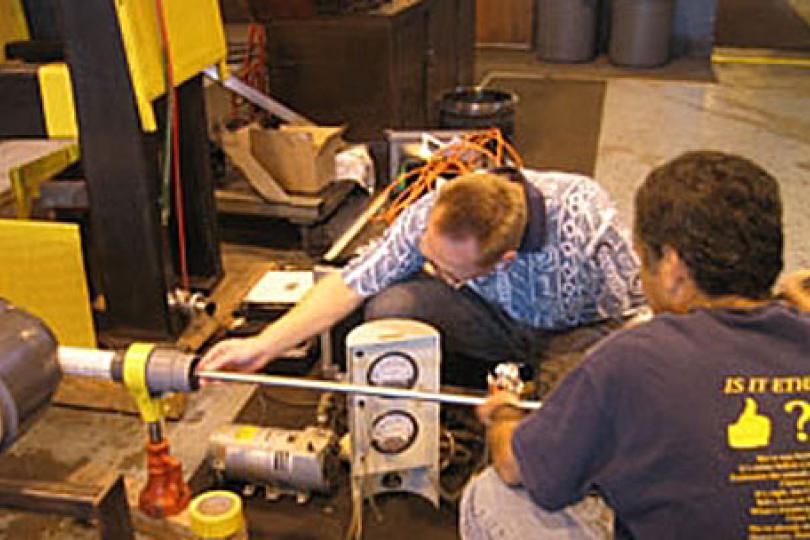Conducting Science that Leads to Environmental Improvement
1988 Switzer Fellow Dr. Mark Schlautman is a professor at Clemson University in the Department of Environmental Engineering and Earth Sciences. A project in which Mark played a key role over a number of years recently made headlines in California. The Brake Pad Partnership, led by San Francisco-based Sustainable Conservation, led the effort to pass legislation reducing the use of copper in brake pads in California.
Rigorous, peer-reviewed studies led by Sustainable Conservation and Mark revealed that up to 60% of the copper found in stormwater run-off in California’s urban areas comes from automobile brake pads. Every time a driver steps on the brakes, copper dust is released onto the roadway, making its way into streams, rivers and lakes.
Copper causes problems at the very root of the aquatic food web. It is toxic to certain species of algae that provide food for most of the aquatic species living in California’s coastal waters and estuaries. In addition, according to researchers at the National Oceanic and Atmospheric Administration (NOAA), it has been found to damage the sensory capabilities of salmon so that they have trouble avoiding predators as they return to spawning grounds.
The legislation, SB 346, signed into law on September 27, 2010, is the result of a 15-year collaborative effort supported in part by the Switzer Foundation. This impressive collaboration, The Brake Pad Partnership, was made up of representatives from the auto industry, brake pad manufacturers, environmental groups, stormwater agencies and coastal municipalities. Mark Schlautman was the Scientific Advisor to the Partnership, with three years of Switzer Leadership Grant support between 2000 and 2004. Sustainable Conservation hired Mark through the Leadership Grant program to advise the multi-stakeholder Partnership as it aimed to understand the transport, fate and effects of copper from brake pads released to the air, ground and waterways of the San Francisco Bay area.
Mark’s initial role was to support Sustainable Conservation by providing independent scientific advice as the organization led the effort to study how copper in brake pads affects water quality, and to bring together the diverse group of stakeholders – each with its own set of interests – to agreement on the extent of the problem and possible solutions. After a year working on the project, the Partnership’s steering committee voted to expand Mark’s status to be technical advisor to the whole Partnership rather than just advising Sustainable Conservation. Ultimately, Mark was responsible for ensuring that the conclusions reached on the technical studies met the rigorous standards of scientific inquiry. According to Ashley Boren, Sustainable Conservation’s Executive Director (and Chair of the Switzer Foundation’s Board of Trustees), a significant part of the legislation’s success was due to the fact that it was “based on very sound, peer-reviewed science. Mark provided invaluable guidance and was a trusted resource by all the stakeholders.”
The remarkable success of the Brake Pad Partnership was due to the commitment by participants to a collaborative strategy. The amount of time and effort involved in making sure the science was effectively communicated and interpreted by such a diverse audience was a new challenge for Mark, who had spent his professional life to date in purely academic research settings. “As a professor, the vast majority of my time and effort goes toward educating young people about the principles of environmental engineering and science and how these disciplines are necessary to preserve our planet’s resources. Therefore, the majority of my professional activities have outcomes that often are not measurable and seldom lead to tangible environmental results,” explains Mark. “The Brake Pad Partnership provided me with invaluable hands-on experience interacting with a stakeholder group to work toward solutions to a real-world environmental problem.”
The Brake Pad Partnership has not been his only scientific contribution to environmental policy. In August 2008 Mark was invited to serve on a science panel comprised mostly of university professors from South Carolina universities and colleges. The purpose of the panel was to assess information pertinent to acceptable minimum water flows for streams and rivers in South Carolina and then provide recommendations to the State Legislature so that standards for minimum instream flows could be developed. In July, 2010 (nearly two years later), the South Carolina state legislature passed the Water Withdrawal Act of 2010 which included specifications for minimum streamflow rules that incorporated some of the panel’s recommendations.
Mark received his Switzer Fellowship in 1988 while he was in the PhD program in Environmental Engineering Science at the California Institute of Technology. He currently teaches and conducts research at Clemson University on topics such as water quality and treatment, aquatic chemistry and environmental geochemistry. He is also a faculty advisor for the University’s student chapter of Engineers Without Borders, where he leads student projects to improve water quality and sanitation in the countries of Liberia, West Africa and in El Salvador and Guatemala in Central America.
Additional Resources
Sustainable Conservation's press release about The Brake Pad Partnership
More about The Brake Pad Partnership
Sustainable Conservation's Frequently Asked Questions about SB 346
